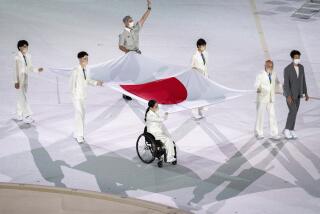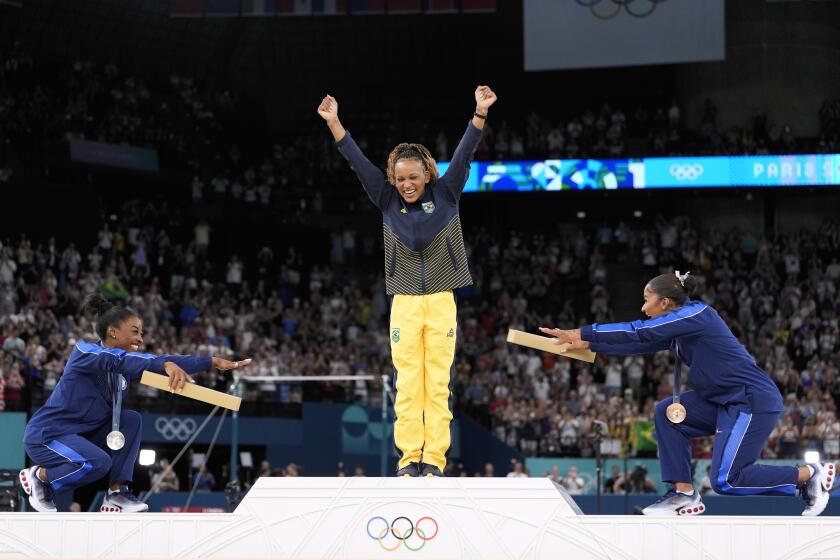Paralympic cyclist Anthony Zahn shrugs off disease
Cyclist Anthony Zahn of Riverside, winner of a bronze medal in the individual time trial road event at the 2008 Beijing Paralympics, is accustomed to racing the clock.
But he’s also engaged in a bigger and unwinnable race, a battle he’s facing with humor and courage.
Zahn, 37, has Charcot-Marie-Tooth disease, a hereditary disorder that affects the nerves in the arms and legs and leads to loss of sensation and atrophied muscles. It has no cure and Zahn said Friday there are correlations between high-intensity activity — such as cycling — and an acceleration of the disease.
That hasn’t stopped him from racing: He will compete twice this weekend at the Paracycling Track World Championships at the Home Depot Center in Carson in hopes of winning a berth in the London Paralympic Games. “I’m not done. I’m far from done yet,” he said.
Zahn didn’t advance out of his qualifying heat in Friday’s 3K individual pursuit but will get another chance Saturday in the 1K individual time trial. A win would get him a ticket to London, to compete two weeks after the Olympics. He will get another shot at the U.S. road championships in Augusta, Ga., in July.
Zahn, who moved to Lincoln, Neb., last summer with his wife, Deane, feels the disease progressing in small ways. An object he easily picked up off the table a few years ago is trickier to lift now. But he’s not ready to retire or give up his independence. He keeps his grandfather’s cane stowed in a closet and is resisting the notion of relying on a wheelchair.
“We have never really confronted this or talked about it, but I don’t think you’re planning on being in a wheelchair any time soon,” said his father, Larry, a retired UC Riverside faculty member.
Anthony has had more than a dozen surgeries on his legs, wrists, shoulder and hands, including a painful procedure that fused the bones of his left foot and transferred a tendon. He can now move that foot only up and down.
“I don’t think I’ve had my eyebrows operated on,” he said, laughing.
He began seeing doctors after he felt weakness in his knees while wrestling and playing football at Riverside Poly High. He was diagnosed when he was about 15, no real surprise to his mother, Connie. Her father had a severe form of the disease that went undiagnosed, she said, and she has a mild version that causes her to trip a lot. Her two younger sons, Will and Patrick, also have mild versions. They have normal-sized legs that dwarf Anthony’s skinny calves but Will’s hands have been weakened.
“As parents, it’s a lot to deal with,” she said.
Anthony could have been devastated. He chose to be defiant.
“I just didn’t really acknowledge it. I just kind of moved on,” he said. “And that’s kind of what I’ve done with it, not acknowledge it.”
He learned about the Paralympics by chance during a race in 2005. A fellow competitor saw his legs and thought he might have muscular dystrophy and told Zahn he should look into the Paralympics.
Competition has gotten tougher nationally and internationally; Zahn recalled seeing 14 entrants at the U.S. road championships in 2005 and 97 last year, including many military veterans. He’s prepared for whatever may come in life or on a bike.
“I race bikes. It’s what I do,” he said. “Gimme a race. Let’s go. This is world championships, home track, home country. Not only is it a race, it’s a big race. Let’s go.”
twitter.com/helenenothelen
More to Read
Go beyond the scoreboard
Get the latest on L.A.'s teams in the daily Sports Report newsletter.
You may occasionally receive promotional content from the Los Angeles Times.








